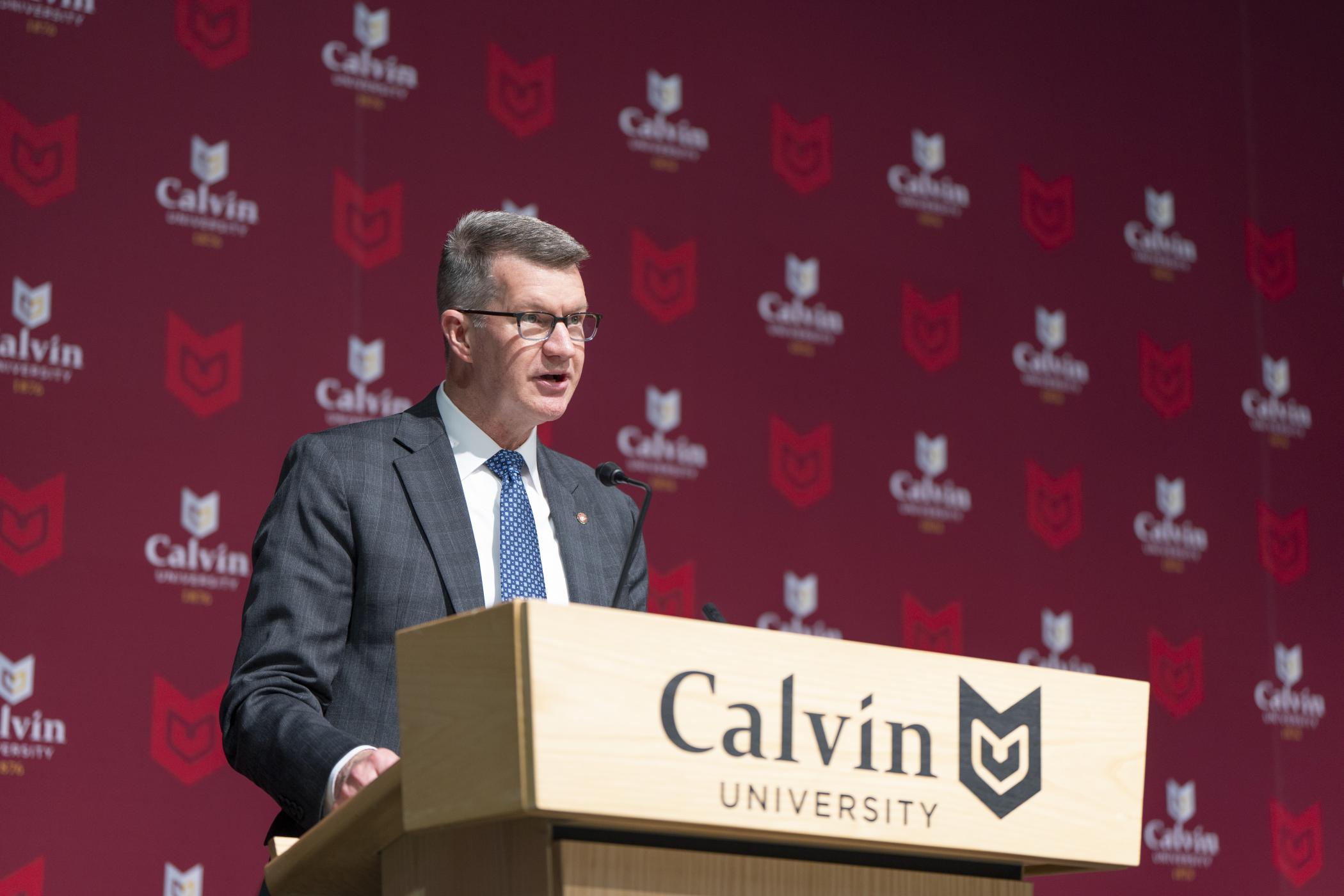After a summer of discernment by a presidential search committee of 16 headed by trustee Perrin Rynders and including alumni, staff and administration, faculty, and student and denominational representation, Calvin University’s board of trustees announced its new president Oct. 21. Greg Elzinga, the former vice president of advancement who has been serving as interim president since late February, is the university’s 13th president.
Elzinga told The Banner that, as he demonstrated in the interim role, he leads “with a posture of listening and learning. I don’t have all the answers, but collectively this is an amazing campus community” able to face “the challenges ahead of us whether they be financial or social, cultural or theological. I firmly believe we have all the people to help us get through that.”
Board Unanimous
Calvin’s announcement said Elzinga’s appointment was unanimously approved by the board of trustees based on the recommendation of the search committee. Rynders is quoted as saying, “We are deeply grateful for God's providence in guiding our search process and bringing us to this moment. The dedication and hard work of each committee member has been instrumental in this journey.”
The announcement indicated the search did not include outside candidates. “The board and search committee agreed that Elzinga’s proven ability to navigate challenges with resilience and his dedication to Calvin's mission make him the best leader for this moment,” the announcement said. Considering the qualities needed in the next president, the announcement said the committee prioritized “having a Christian commitment, an ability to serve as a dynamic external ambassador, an influential fundraiser, and as a steadfast advocate for diversity, equity, inclusion, and belonging (DEIB). They found Elzinga to exemplify these qualities.”
Elzinga and his wife, Jacqui, are members of Cascade Fellowship CRC in Grand Rapids where they have belonged for 21 years and where he has served terms as an elder, deacon, and currently the vice chair of the church’s council.
Calvin to Respond to Synod
One of the tasks before Calvin’s board of trustees is to respond to Synod 2025 of the Christian Reformed Church in North America on its progress in defining “the differences in Calvin’s use of ‘confessional difficulties’ in relation to the decisions of synod concerning gravamina and to develop language and processes in alignment with those in the CRC” (Acts of Synod 2024 p. 882). Synod 2024 clarified the use of gravamina—formal expressions of difficulty with a teaching in a confession of the church—and specified that they are “not meant to be, nor should be, used as an exception to the confessions.” Officebearers in the CRC and faculty at Calvin University commit to upholding the church’s confessions in the Covenant for Officebearers, which indicates it is “to be signed by professors, ministers, commissioned pastors, elders, and deacons when ordained and/or installed in office.”
Elzinga said he’s optimistic about this request of the board. “I believe there are ways in which we can find a path forward that we both align with and honor a 149-year relationship with the Christian Reformed Church of North America but also do that in ways that allow us to continue to deliver on the educational mission that we have as a university. I don’t view it as some people do as kind of ‘an either or’—either you align with the denomination or synod and you give up your educational mission or you have to focus on your educational mission of academic freedom and you give up confessional commitment. I think we have a wonderful track record of balancing the two: confessional commitment as an institution of the Christian Reformed Church, but doing so in the context of being an institution of higher education,” Elzinga said.
Season of Growth, Strengthening Workplace Culture
In Calvin’s announcement of the presidential appointment, Elzinga named four priorities in this next season: "leveraging comprehensive enrollment growth, making disciplined investments in infrastructure, strengthening workplace culture, and fundraising.” He said the vision for growth, which is not his alone, “involves all aspects of different learning communities from traditional undergraduate students, which is what most people think about when they think of Calvin,” and also includes graduate and continuing studies. “We have strategically invested in graduate programs that leverage some of the strengths we already have at Calvin to reach out to a whole new category of learners,” Elzinga said. And not only for masters programs. “There’s a whole percentage of people in our world who have two years or less of a college education who would like to finish their degree or at least work towards completing a degree, and Calvin can help with those needs,” Elizinga said.
Elzinga sees strengthening workplace culture as “staying focused on the mission that God has given us,” operating as what he calls “one Calvin”—not meaning that everyone would agree on everything but “even in the midst of disagreement that we stay focused on our mission, which is to equip students to think deeply, to act justly and to live wholeheartedly as Christ’s agents of renewal.” Elzinga considers it a responsibility of leadership to “do our very best to try and minimize some of the noise that can be surrounding all of us, to make sure that we are all uniquely focused on that mission of equipping students in an academically excellent and distinctly Christ-centered way.”
He said that “begins with building and maintaining trust with our entire campus community, including defining reality, which involves being transparent about both our opportunities and our challenges ahead of us, and each person trusting the other to carry out the roles that God has given to them in this institution.”
Elzinga said he will be doing a “share and listen” tour throughout the Calvin campus as part of his first steps in creating that kind of environment as president.
About the Author
Alissa Vernon is the news editor for The Banner.

